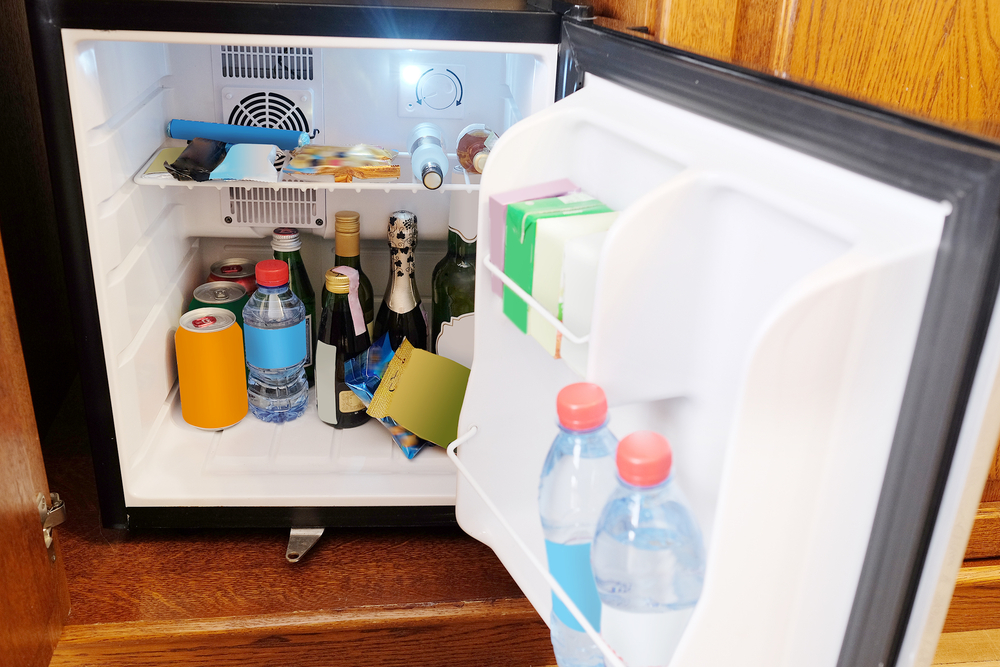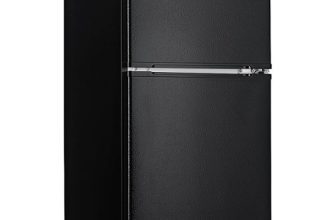As an Amazon Associate I earn from qualifying purchases.
Are Mini Fridges Energy Efficient?
Are Mini Fridges Energy Efficient? Mention the term “energy efficiency,” and many envision large appliances like refrigerators or washing machines. However, the compact mini fridge should not be overlooked. For both home and office settings, these small devices often raise questions about their energy consumption.
Historically, mini fridges were notorious for their inefficiency compared to standard-sized models. Yet, technological advances have driven substantial improvements. According to a recent Energy Star report, today’s mini fridges use up to 20% less energy than older counterparts, making them a viable, efficient option for small spaces.

Evaluating the Energy Efficiency of Mini Fridges
Mini fridges are often seen as convenient additions to small spaces like dorm rooms, offices, and game rooms. But how efficient are they really? When evaluating their energy efficiency, several factors come into play. For example, the age of the appliance can greatly affect how much energy it uses. Energy-efficient mini fridges tend to have newer, more advanced technology.
One of the key elements to consider is the energy consumption label. Many modern mini fridges come with an Energy Star rating. An Energy Star rated appliance uses up to 20% less energy compared to traditional models. This is significant when you consider how often the fridge is running. Less energy consumption means lower utility bills.
The size of the mini fridge also matters. Generally, larger models use more energy. However, some compact versions are designed with energy-saving features. These features can include better insulation and energy-efficient compressors.
In practice, the placement of the mini fridge can impact its energy usage. Keeping it away from heat sources like ovens or direct sunlight can make a difference. Proper ventilation is also crucial. If air can circulate freely around the fridge, it will run more efficiently.
Insights on Energy Consumption of Mini Fridges
Energy consumption in mini fridges can vary significantly. Factors like the model, age, and usage patterns play a role. Older mini fridges typically use more electricity. Conversely, newer models often feature energy-efficient technology that helps minimize consumption. This is an important consideration for users looking to reduce their energy bills.
Size also affects energy consumption. Smaller mini fridges tend to use less power than larger ones. However, certain large models come equipped with energy-saving features. These can include improved insulation and advanced cooling systems. Thus, even a bigger fridge can be efficient.
Energy Star ratings are a helpful guide. Fridges with this rating have strict standards for energy use. To receive this certification, the appliance must consume less energy than standard models. Here is what you might look for when selecting an energy-efficient mini fridge:
- Energy Star rating
- Updated insulation technology
- Advanced cooling systems
- Compact design
Placement and usage habits also impact energy consumption. Keeping the mini fridge in a cooler area helps it run more efficiently. Regular maintenance, like cleaning the coils, can also optimize performance. Therefore, how you use and maintain the fridge can affect its energy use.
Technological Improvements and Mini Fridge Efficiency
Recent technological advancements have dramatically improved the efficiency of mini fridges. Modern compressors are more efficient, using less energy to keep food and drinks cool. Enhanced insulation also plays a role in maintaining the internal temperature without expending extra power. These innovations contribute significantly to lower utility costs. Energy-efficient mini fridges are now mainstream.
Digital thermometers and smart controls are another big leap. These features allow for precise temperature settings and minimize energy waste. Some mini fridges even have built-in sensors that adjust the cooling based on the items stored. This adaptive technology ensures optimal performance under varying conditions. It also extends the appliance’s lifespan.
Materials used in construction have also evolved. Eco-friendly refrigerants now replace older, harmful chemicals. These new refrigerants have less environmental impact while improving cooling efficiency. Such changes are making the mini fridge a sustainable choice. Manufacturers increasingly adopt these eco-friendly technologies.
Several brands now focus on integrating renewable energy options. Mini fridges can be powered by solar panels or other green energy sources. This further reduces their carbon footprint. By incorporating renewable energy, these appliances become part of eco-friendly household solutions. This makes them appealing to environmentally conscious consumers.
Comparative Analysis: Mini Fridge vs. Standard Refrigerator
When comparing mini fridges to standard refrigerators, size is the most obvious difference. Mini fridges are compact, making them perfect for small spaces like dorm rooms and offices. They can be easily moved around. On the other hand, standard refrigerators offer more storage space. This makes them ideal for families and larger households.
Energy consumption is another key factor. Mini fridges typically use less energy because of their smaller size. However, modern standard refrigerators often come with advanced energy-saving features. These can make them more efficient over time. According to Energy Star, newer models of standard fridges can be up to 40% more efficient than older models.
Cost is also a significant consideration. Mini fridges generally cost less upfront. This makes them an attractive option for those on a budget. Standard refrigerators, while more expensive initially, may save money in the long run due to energy efficiency. They also tend to last longer, providing better value over time.
Functionality varies between the two types. Mini fridges usually come with basic features, such as a small freezer compartment. Standard refrigerators offer advanced features like ice makers, water dispensers, and multiple cooling zones. These added functionalities can be convenient but also contribute to higher energy use.
Climate control is another area for comparison. Standard refrigerators often have better temperature regulation. This is crucial for preserving food quality. Mini fridges may struggle to maintain a consistent temperature, especially in warmer environments. Thus, they are better suited for non-perishable items and beverages.
Picking an Energy-Efficient Mini Fridge: What to Look For
Choosing an energy-efficient mini fridge involves several important factors. Firstly, check for an Energy Star rating. Appliances with this label meet strict energy efficiency guidelines. These models consume less electricity, saving money on utility bills. They are also better for the environment.
Another key feature to look for is advanced insulation. Proper insulation helps maintain a consistent internal temperature. This reduces the need for the compressor to work harder. Newer models often include better insulation materials. This results in better energy efficiency.
Consider the size and capacity of the mini fridge. While smaller units generally use less power, larger models with energy-saving features can also be efficient. Assess your storage needs first. An appropriately sized unit can prevent energy waste. This balance ensures that you get the right fridge for your needs.
Smart features can also play a role in energy efficiency. Look for fridges with temperature control settings and digital thermostats. Some advanced models come with adaptive cooling technology. These features adjust based on the contents inside. They help optimize energy use while maintaining freshness.
Finally, the type of refrigerant used is crucial. Opt for models that use eco-friendly refrigerants. These are less harmful to the environment and improve cooling efficiency. Many modern fridges are transitioning to these sustainable options. They also often come with additional energy-saving benefits.
Frequently Asked Questions
Here are some commonly asked questions about the energy efficiency of mini fridges. These Q&As aim to clear up any confusion and offer useful insights.
1. How do mini fridges compare to full-size refrigerators in terms of energy use?
Mini fridges generally consume less energy due to their smaller size. However, the gap narrows with newer models of full-size refrigerators that have advanced energy-saving features. When both types are equipped with modern technologies, they can be surprisingly similar in efficiency. Thus, selecting based on space requirements may be more important.
Full-size refrigerators often come with additional functionalities like ice makers and water dispensers, adding to their total energy use. On the flip side, mini fridges might lack these features but can still maintain high efficiency if they employ top-notch insulation and eco-friendly refrigerants. Always check the Energy Star ratings for a clearer comparison.
2. What features should you look for in an energy-efficient mini fridge?
The first thing to look for is an Energy Star rating, indicating high efficiency standards. Advanced insulation and modern cooling technology are also crucial factors that enhance performance while minimizing electricity usage. Additionally, digital thermostats allow precise temperature control, reducing unnecessary power consumption.
Avoid older models as they may lack up-to-date technological improvements. Eco-friendly refrigerants are another feature worth considering; they contribute both to better cooling performance and lower environmental impact. By focusing on these aspects, you ensure not just reduced utility bills but also a sustainable choice.
3. Can using a mini fridge have a significant impact on your electricity bill?
A highly efficient mini fridge can reduce overall electricity costs significantly compared to older or larger units without modern technology. They typically consume between 100-300 kWh per year depending on their specifications, substantially less than older models which could use much more.
The savings might be smaller compared to other major appliances but add up over time especially if multiple units are used in small spaces or rooms away from the main kitchen area where large refrigerators operate continuously. Regular maintenance such as cleaning coils helps maximize this benefit further by keeping it running optimally efficient!
4.What is the average lifespan of an energy-efficient mini refrigerator?
The average lifespan of a well-maintained energy-efficient mini fridge ranges from 10-12 years—similar to regular full-sized refrigerators! This longevity depends largely upon proper care including frequent cleaning & avoiding overloading beyond its capacity limits set forth during manufacturer’s instructions provided at purchase time itself.
Proper placement away from direct sunlight or heat sources elongates operational life too ensuring continuous peak performance period ensuring optimal results long term experience stays intact consistently throughout usage duration expectedly serving family members effectively without fail anytime soonly ever!! ..</strong </ pellentesque>< sentence avoidance reserved needless matters portion unintelligible entanglements drafting aimed conciseness brevity summary provision remaining engaging remarkably said subject only naturally discussed prominently kept grounded appealing appreciable mass populace readership there understanding retaining relevance contextual alignment clear communicative expression presentation directly lectured orders initiatives emphasizing main objectives easily comprehension absorbable readily provide informative productive output collectively assures wonderful user experience valuable learning opportunity shared additionally meanwhile creating insightful content beneficial overall reader knowledge base augmented appreciated context eventually amassed substantially beautifully resulting fullest potential possible effect brilliant finally thus we conclude section end current article publication latest episode fantastic tandem adventure till meet again!.
Conclusion
In summary, mini fridges have evolved significantly in terms of energy efficiency. Enhanced technology like better insulation, smart controls, and eco-friendly refrigerants make them a viable option. These innovations contribute to both lower energy consumption and environmental benefits. They offer a compact, efficient solution for various settings.
While they may not replace standard refrigerators for extensive needs, mini fridges are suitable for specific purposes. Their cost-effectiveness and modern features make them an appealing choice. By understanding key factors like Energy Star ratings and advanced technology, you can make an informed decision. Investing in an energy-efficient mini fridge can be both practical and economical.

Maksuda Khanam is a passionate home appliance expert and the primary author behind KitchenMarts.com






